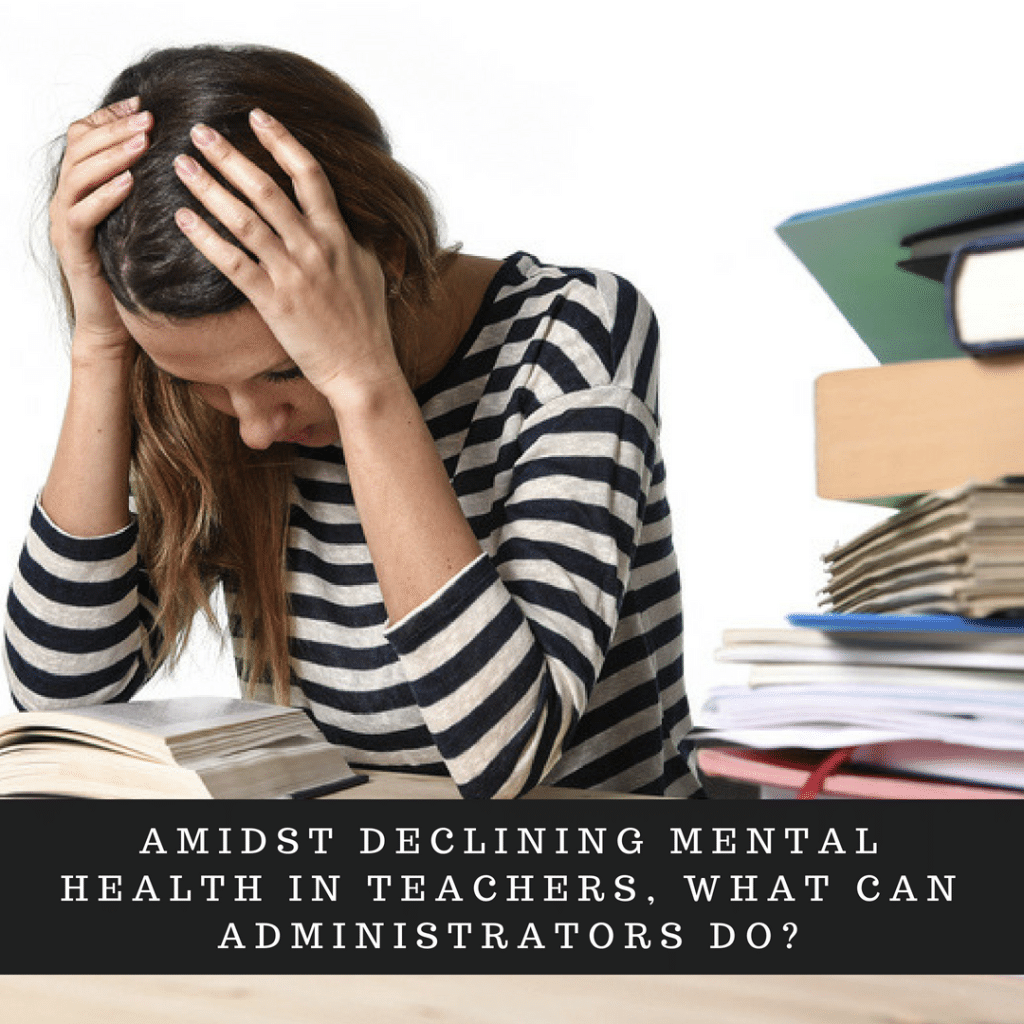In 2017, a survey conducted by the American Federation of Teachers and the Badass Teachers Association indicated that more than half of the teachers surveyed said their mental health was “not good” while a survey from 2015 showed that only 34% of teachers felt this way (USA Today, 2017). Unfortunately, amongst the many teachers I’ve spoken to about this issue and who also suffer from mental health issues, a vast majority feel that the subject of mental health is still a stigma for educators. After all, we are in charge of molding the minds of young people. Who will trust us to teach them if we suffer from depression, anxiety, or one of many other forms of mental illness? What teachers really need is support from administrators without judgment so that they can survive in an increasingly stressful career.
So, How Can Administrators Help With Mental Health Issues?
So the question is, what can administrators do amidst the declining mental health in teachers? There are a few ways they can make it easier for their staff.
1. Have an open-door policy
Make sure your employees know that they can come to talk to you at any time. Sometimes teachers are afraid to talk to their administrators because they feel like they aren’t really allowed to come to them with their problems. Making sure your staff knows they can talk to you is the first important step in ensuring that they feel supported.
2. Just listen
Be available to listen and don’t make your teachers feel rushed when they talk to you, especially if you sense they are going through some emotional turmoil. Keep an open mind and listen to their concerns.
3. Offer to be a support system
When a teacher comes to you with stress, depression, or anxiety, offer your support. Tell them you will help in any way you can. Make sure you are positive and that you demonstrate true compassion for what they are going through.
4. Provide a relaxation room
This one might be a challenge if you don’t have extra rooms in your building. However, if there is a room, even a small one, turn it into a place where employees can go to calm down and relax. Do you have a break room for staff? Turn that into a relaxation space. Keep the lights low, have comfortable places for teachers to sit like a comfy couch or chair, and add some stress relieving tools to the room. It might be helpful to ask support staff who help children with emotional issues what kinds of things help to relieve stress and add those things to the relaxation room.
[bctt tweet=”Teachers need time for mental health appointments. ” username=””]
5. Accommodate teachers who have mental health appointments
I know there have been times that I have put off mental health appointments because they have been during work hours and taking time off has been frowned upon. Once you know an employee is struggling with their mental health, let them know that it’s okay to take time to go to their appointments in order for them to maintain stability during stressful times.
6. Allow teachers to leave school during their planning time
This is not something teachers should do every day, but if they need to just take a break every once in a while and leave to let off some steam or stress, allow them to take that time to do it. As long as it does not interfere with staff development or lesson planning, there is no danger in allowing staff members to get away for a few minutes to get it together.
7. Provide opportunities for teachers to form support groups for each other
Sometimes teachers just need the opportunity to talk and feel heard and understood by other teachers who might be going through the same things they are. The validation they get through these opportunities can help them form bonds with others and feel more connected to the school community. Human connection is often a struggle for people undergoing mental health problems, so providing these opportunities can be a real help for teachers.
These are just a few options for helping teachers amidst a growing crisis in the education field. It’s important to ensure you do everything you can to support teachers during times of stress so that mental health issues do not become a bigger problem. Additionally, providing these supports might help prevent some teachers from having diagnosable mental health problems. Just knowing that there are supports at work and places to relieve stress can make a big difference for teachers experiencing a lot of stress at work.
Remember mental health is important and we need principals to help make it a practice in their schools.







